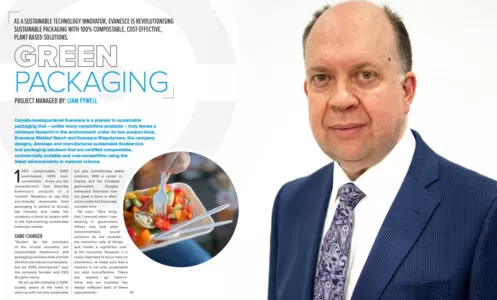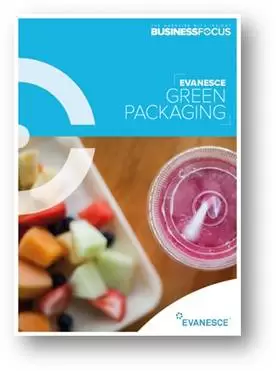As a sustainable technology innovator, Evanesce is revolutionising sustainable packaging with 100% compostable, cost-effective, plant-based solutions.
Canada-headquartered Evanesce is a pioneer in sustainable packaging that – unlike many competitive products – truly leaves a minimum footprint in the environment: under its two product lines, Evanesce Molded Starch and Evanesce Biopolymer, the company designs, develops and manufactures sustainable foodservice and packaging solutions that are certified compostable, commercially scalable and cost-competitive using the latest advancements in material science.
100% compostable, 100% plant-based, 100% cost-competitive – those are the characteristics that describe Evanesce’s products in a nutshell. Needless to say, this eco-friendly disposable food packaging is poised to disrupt the industry and make the company a force to reckon with in the fast-evolving sustainable materials market.
Game-changer
“Guided by the principles of the circular economy, our compostable foodservice and packaging solutions look and feel like their petroleum counterparts, but are 100% plant-based,” says the company founder and CEO Douglas Horne.
He set up the company in 2016, acutely aware of the need to come up with not only sustainable but also economically viable solutions. With a career in finance and the Canadian government, Douglas witnessed first-hand how too great a focus is often put on noble but financially unviable aims.
He says: “One thing that I learned when I was working in government offices was that often environmentally sound solutions do not consider the economic side of things, and create a significant cost to the consumer. However, it is really important to focus hard on economics, to make sure that a solution is not only sustainable but also cost-effective. These two aspects go hand-in-hand, and our business has always reflected both of these requirements.”
Douglas has built several successful companies throughout his career and when he came across a group with fantastic technology, completely plant-based, he immediately saw the potential.
“We acquired that technology in 2017, went through the process of commercialising it and getting it into full-scale production in 2021. We are now really excited about bringing this technology to the market,” he says.


